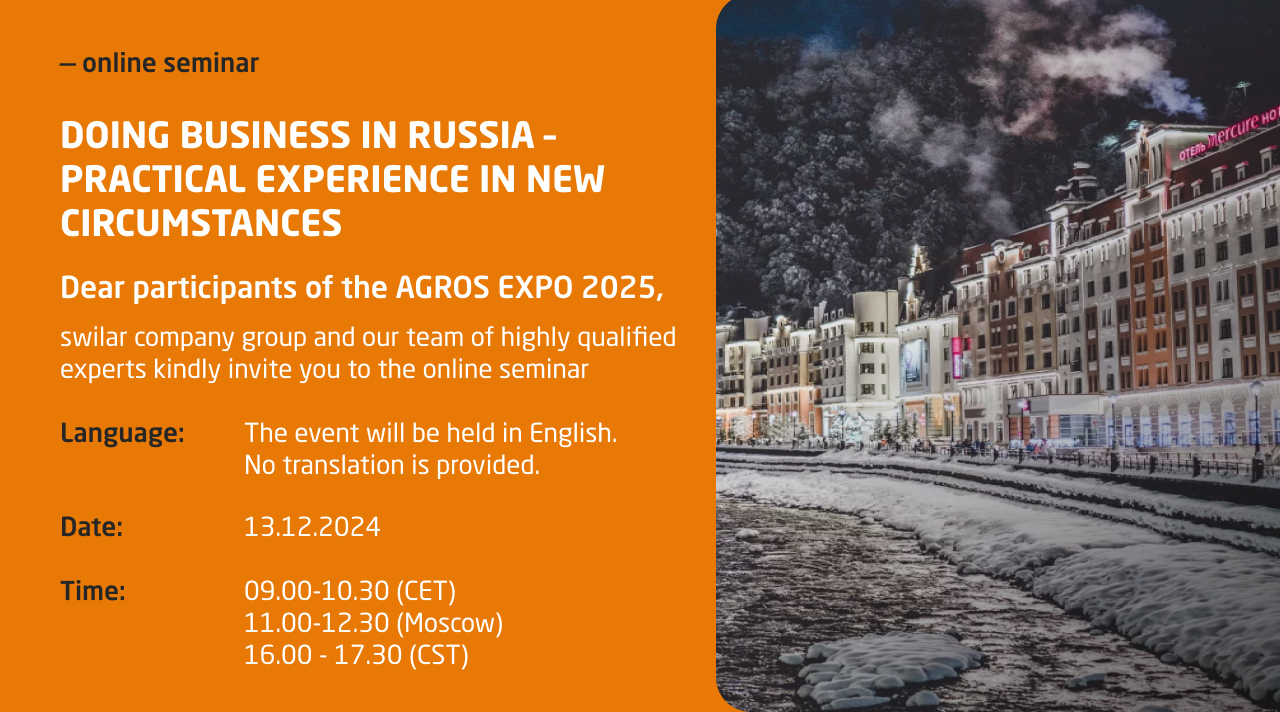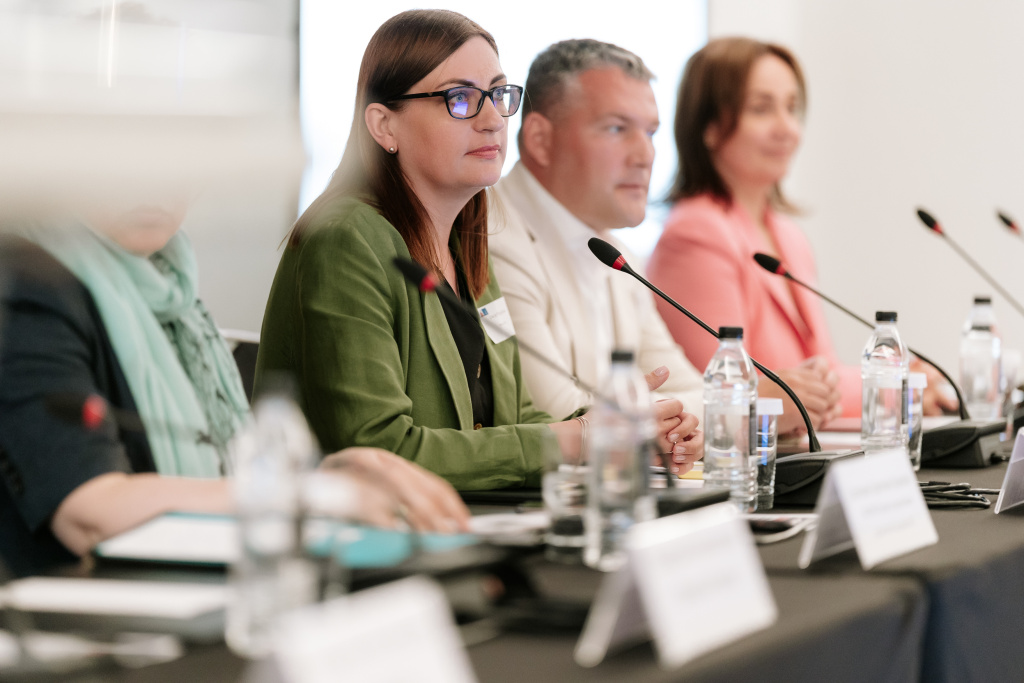Category: Corporate issues
Information on participants of a foreign organization for 2024 – submit before 03/28/2025
Dear Clients,
please pay attention that the term for submission of information on the participants of a foreign organization for 2024 expires on March 28th, 2025.
All foreign organizations and foreign structures without formation of a legal entity registered with tax authorities in the Russian Federation are obliged to inform the tax authorities of all direct participants and beneficiaries regardless of the share of participation, as well as of indirect participation of an individual or a public company (if their share exceeds 5%).
The above-mentioned information is to be submitted to the tax authority not later than on March 28th each year. An exception is foreign organizations that are registered with a Russian tax authority only for provision of services in electronic form.
Non-submission or late submission of the information entails a fine of RUB 50,000.
You can find our earlier publications on this issue here and here.
We will gladly support you in preparing and submitting information on the participants/beneficiaries of a foreign organization to the tax authorities.
Other news

10.02.2026
Environmental Fee: what changed since January 1, 2026 and what business should expect

23.12.2025
Dear colleagues, Please accept our sincere congratulations on the upcoming New Year and Christmas!
Сhanges to corporate legislation: holding of meetings in companies
Dear Sirs or Mesdames,
we would like to inform you about the changes in the field of corporate law which will be important in the nearest time.
From March 01, 2025, significant new developments made by the Federal Law dated August 08, 2024 No. 287-FZ will come into force. A number of changes relates to limited liability companies (LLC).
So, the rules of holding general meetings of LLC participants have been amended, the related terminology has been changed. New rules will be applied, namely, while holding the annual meetings of participants according to the results of the year 2024.
Main changes are as follows:
The expression “general meeting” has been changed to “adoption of a resolution by the general meeting” or “meeting or absentee voting for adoption of a resolution by the general meeting”.
The meeting chairman will be elected only if the company does not have a Board of Directors (Supervisory Board). If it exists, the Chairman of such Board of Directors will take chair.
The forms of the general meeting will be as follows:
- a meeting, possible with remote participation;
- absentee voting, incl. by e-bulletins;
- a meeting combined with absentee voting.
In case of remote participation:
- participation will be executed using electronic/technical communications;
- a possibility is established to attend a meeting at the place of its holding or to hold a meeting without determining a place of holding;
- a possibility is established to make an online-broadcasting with access for the registered persons (upon a participant’s demand the company is obliged to provide access to the broadcasting recording).
Additionally, the rules of holding meetings combined with absentee voting have been fixed. Such meetings may be held in the cases stipulated by the company’s articles of association or by a unanimous resolution of all the company participants. Approval of annual reports and accounting (financial) statements is admitted at such meetings.
A separate article has been introduced dedicated to drafting and contents of the minutes of an LLC general meeting. It also stipulates that signing of the minutes by the secretary of the meeting will not be required.
Furthermore, a procedure was established in relation to adopting resolutions by the Board of Directors (the supervisory authority which is formed when it is stipulated by the articles of association). This authority may adopt resolutions at meetings (including those with remote participation) or by means of absentee voting. Similarly to meetings of company’s participants, meetings of the Board of Directors will be held with the possibility of personal attendance at the place of their holding as well as without determining such place.
The quorum when adopting Board resolutions will be not less than 1/2 of the number of Board members (if the greater number is not stipulated by the articles of association). The meeting may be combined with absentee voting.
The minutes according to the results of the meeting or the absentee voting will be prepared not later than 3 calendar days after the meeting or the end of document acceptance from the Board members (in case of absentee voting).
We will be happy to answer your questions arising in connection with the specified changes.
Your contacts on this topic:
Maria Matrosova
Nadezhda Maskaeva
Other news

10.02.2026
Environmental Fee: what changed since January 1, 2026 and what business should expect

23.12.2025
Dear colleagues, Please accept our sincere congratulations on the upcoming New Year and Christmas!
SWISS & RUSSIAN VIEWS AND PERSPECTIVES BY ACADEMIA AND BUSINESS
Daria Pogodina spoke at the conference “Swiss & Russian Views and Perspectives by Academia and Business” with the report on the topic “Practical Experience in Intercultural Communication with German-Speaking Countries”. As a part of the presentation, the speaker shared practical observations and cases from professional interaction with partners from Germany, Austria and Switzerland. The issues of differences in business culture, communication models were considered, and recommendations were given on how to build cooperation in an intercultural environment effectively. The report aroused keen interest among participants from the academic and business environment.
Other news

10.02.2026
Environmental Fee: what changed since January 1, 2026 and what business should expect

23.12.2025
Dear colleagues, Please accept our sincere congratulations on the upcoming New Year and Christmas!
Online seminar 13.12.2024: Doing Business in Russia – Practical Experience in New Circumstances

PROGRAM
Detailed reviews and Q&A session with experienced experts on the following topics
1. Doing business in Russia
Legal, tax, HR and migration issues. Basics.
2. Overview on bank transaction with Russia
SWIFT, currency exchange and other.
3. Practical experience of foreign companies in Russia
FAQ in the regular business processes.
Online seminar 11/12/2024: Features of liquidation of companies with foreign participation: latest changes and practice
PROGRAM
1. Features of liquidation of foreign subsidiaries in 2024-2025.
Daria Pogodina, Managing Partner of swilar
2. Liquidation audit – features of the procedure.
Olga Grigorieva, General Director of Sterngoff Audit
3. Closing representative offices and branches of foreign companies – what to consider?
Daria Pogodina, Managing Partner of swilar
4. Features of termination of employment relations with employees during company liquidation.
Elena Balashova, Managing Partner of Balashova Legal Consultants
5. Planning the budget and financing of the company during the liquidation period.
Natalia Samonova, Head of Controlling Projects of swilar
6. Business valuation in Russia for the purpose of submission to the Government Commission.
Alexey Sitnikov, Director, Swiss Appraisal
Counterparty verification in the CIS countries: Kazakhstan
Daria Pogodina gave a presentation at the Moscow Chamber of Commerce and Industry on the topic of “Checking a Counterparty in the CIS Countries: Kazakhstan”. The speaker shared practical recommendations for checking the reliability of partners in the jurisdiction of Kazakhstan, highlighted available sources of information, features of corporate legislation and possible risks when working with local companies. The presentation was especially useful for participants conducting foreign economic activity in the CIS.
Other news

10.02.2026
Environmental Fee: what changed since January 1, 2026 and what business should expect

23.12.2025
Dear colleagues, Please accept our sincere congratulations on the upcoming New Year and Christmas!
swilar at the Russian-German Chamber of Commerce Conference
On June 5, swilar spoke at the annual Conference for CFOs of the Tax and Financial Reporting Committee of the Russian-German Chamber of Commerce.
Daria Pogodina, CEO of swilar, spoke on the topic that the company constantly monitors — “The current situation with payments to friendly countries.” Conference participants highly appreciated the comprehensive analysis and effective practical recommendations that were given in the report.
The VTP conference became a platform for lively discussions and exchange of experience between CFOs of leading foreign companies, especially regarding the situation with expected tax changes, international payments and financial service management in the context of the economic crisis.


Other news

10.02.2026
Environmental Fee: what changed since January 1, 2026 and what business should expect

23.12.2025
Dear colleagues, Please accept our sincere congratulations on the upcoming New Year and Christmas!
Changes in corporate legislation from 01.09.2024
We hereby inform you that Federal Law No. 287-FZ of August 08, 2024 introduced a number of important changes affecting both limited liability companies (OOO) and joint-stock companies (AO). The changes come into effect at different times. In this message, we would like to talk about changes in relation to OOO that will be in effect from September 01, 2024.
From this date, the resolution on the election (appointment) of the sole executive body of the OOO – for example, the general director – will need to be necessarily certified by a notary. Also, when registering such changes in the Unified State Register of Legal Entities, a notary will be the applicant.
Thus, the procedure for changing the general director in an OOO has been significantly changed. Previously, participants could make such a resolution without a notary (if an alternative procedure was stipulated in the articles of association), and then the new director would sign the application for registration himself. Now the participants or their representatives will be required to be present at the Russian notary to make a resolution (with the issuance of the appropriate certificate), after which the notary will sign an application sent by him to the registration authority.
For foreign participants in Russian OOO, such changes mean the presence of two options:
- arrival in the Russian Federation and visiting a Russian notary to make a resolution on changing the director of a controlled Russian company;
- issuance of a power of attorney to Russian representatives for carrying out such actions (please note that the power of attorney must be properly legalized and translated into Russian).
At the moment, we are awaiting clarification regarding whether notarization will be mandatory for participants to make resolutions on extending the powers of the general directors of OOO, as well as the beginning of the liquidation of controlled companies.
With regard to the liquidation of an OOO, from September 01, it is legislatively confirmed that the notary submits to the Federal Tax Service (FTS) a notification about the formation of a liquidation commission/appointment of a liquidator. Such a notification is usually sent simultaneously with the message that the legal entity is entering into the process of liquidation. The notification shall be submitted to the Federal Tax Service by the notary who certified the liquidator’s signature on it, no later than the end of the working day on which the notification was signed.
According to another change, from September 01, the list of information on shares in the authorized capital of OOO, which is contained in the Unified State Register of Legal Entities, is being expanded. The Register will contain information about the arrest of the share imposed by the court or enforcement officer. So far, the Unified State Register of Legal Entities includes information on the size, nominal value of shares and shareholders.
In the future, we will inform you about other significant changes to corporate legislation introduced by Federal Law No. 287-FZ dated August 08, 2024.
We will be happy to answer your questions and, if necessary, support you in the preparation, signing and submission of relevant documents to the authorized bodies.
Contacts:
Maria Matrossowa
Nadezhda Maskaeva
Other news

10.02.2026
Environmental Fee: what changed since January 1, 2026 and what business should expect

23.12.2025
Dear colleagues, Please accept our sincere congratulations on the upcoming New Year and Christmas!
Planning the budget and financing of the company during the liquidation period
Eugenia Chernova spoke at a joint meeting of the Legal Affairs Committee, the Accounting Group and the Controlling Group with a report on “Planning the budget and financing of a company during liquidation”. The speaker covered key aspects of financial planning at the final stage of a company’s activities, including cost control, optimization of resource allocation, tax implications and interaction with counterparties. Both legal and accounting nuances were considered, which made the report especially useful for specialists involved in the liquidation process.
Other news

10.02.2026
Environmental Fee: what changed since January 1, 2026 and what business should expect

23.12.2025
Dear colleagues, Please accept our sincere congratulations on the upcoming New Year and Christmas!
Article “Association Russian-Turkish Dialogue. PRACTICE of international payments in current conditions”
Daria Pogodina wrote an article for the Russian-Turkish Dialogue Association on the topic of “International Payment Practices in Current Conditions”. In the article the speaker analyzes in detail the changes in the regulation of international settlements and their impact on businesses working with Turkey. New challenges arising in cross-border payments are considered, as well as practical recommendations for using alternative payment systems and minimizing risks. Particular attention is paid to issues of compliance with legislation and optimization of financial transactions in the context of instability in international markets.
Other news

10.02.2026
Environmental Fee: what changed since January 1, 2026 and what business should expect

23.12.2025
